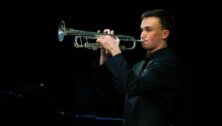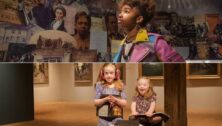The Choristers to Perform ‘My Heart Be Brave: Choral Works on a Theme of Moral Courage’ on Saturday

The Choristers — a 50-voice, semi-professional concert choir — will present “My Heart Be Brave: Choral Works on a Theme of Moral Courage” on Saturday, Nov. 23 at 7:30 PM at Trinity Lutheran Church in Lansdale.
The concert has two halves of completely different, but thematically connected, music. The first half is comprised of music from the British/Anglican tradition performed a cappella (meaning sung with no accompaniment) and by double choir (meaning the choir is separated into two, with each singing different music).
The major work in the first half is Vaughan Williams’s challenging yet exquisite Mass in G Minor. Williams wrote Mass in 1921 following his experiences as a medical orderly in Word War I, when he lost several close friends and relatives, which prompted this composition of profound spirituality. Listen below to the beginning of the fourth movement: “Sanctus” means “Holy.” You will hear a heavenly introduction leading to an exciting ending.
The second half of the concert is comprised of “non-idiomatic” choral music by Black composers. “Non-idiomatic” refers to original concert music that is not part of the traditional canon associated with Black musicians — i.e., spirituals, gospel, and jazz.
From late 19th century through the beginning of the 21st century, Black composers worked in the shadows of commercial success unless they arranged/published spirituals and jazz. Through the second half programming, The Choristers are holding up undeservedly unknown works for the audience to experience.
The title of the concert comes from the final work in the concert: Marques Garrett’s My Heart Be Brave. The text of the choral work is the following poem, titled “Sonnet” and written by Black poet and civil rights activist James Weldon Johnson (1871-1938).
My heart be brave, and do not falter so,
Nor utter more that deep, despairing wail.
Thy way is very dark and drear I know,
But do not let thy strength and courage fail;
For certain as the raven-winged night
Is followed by the bright and blushing morn,
Thy coming morrow will be clear and bright;
’Tis darkest when the night is furthest worn.
Look up, and out, beyond, surrounding clouds,
And do not in thine own gross darkness grope,
Rise up, and casting off thy hind’ring shrouds,
Cling thou to this, and ever inspiring hope:
Tho’ thick the battle and tho’ fierce the fight,
There is [a] power [in] making for the right.
In the poem, Johnson addresses the unavoidable darkness in the world. The speaker asks his heart to confront the gloom and to remember that it’s always the darkest right before the morning comes. In the end, he concludes that the scariest and most terrible parts of the world may be pushed back by one who strives to do what’s right.
Mass in G Minor is thematically connected through the bravery Williams showed during the war. At 42, he was old enough to have been excused from service. Instead, he voluntarily enlisted in the Royal Army Medical Corps, serving as a medical orderly. Orderlies were called upon to rescue wounded and dying soldiers from within the battlefield, even while under heavy bombardment. Williams, most certainly, had to tell his heart to be brave.
Learn more and purchase discounted tickets at The Choristers. If you have any questions or want to order tickets without giving your credit card information, e-mail the choir at Info@TheChoristers.org and provide your name and telephone number, and a representative of the choir will respond.

Connect With Your Community
Subscribe for stories that matter!
"*" indicates required fields






























